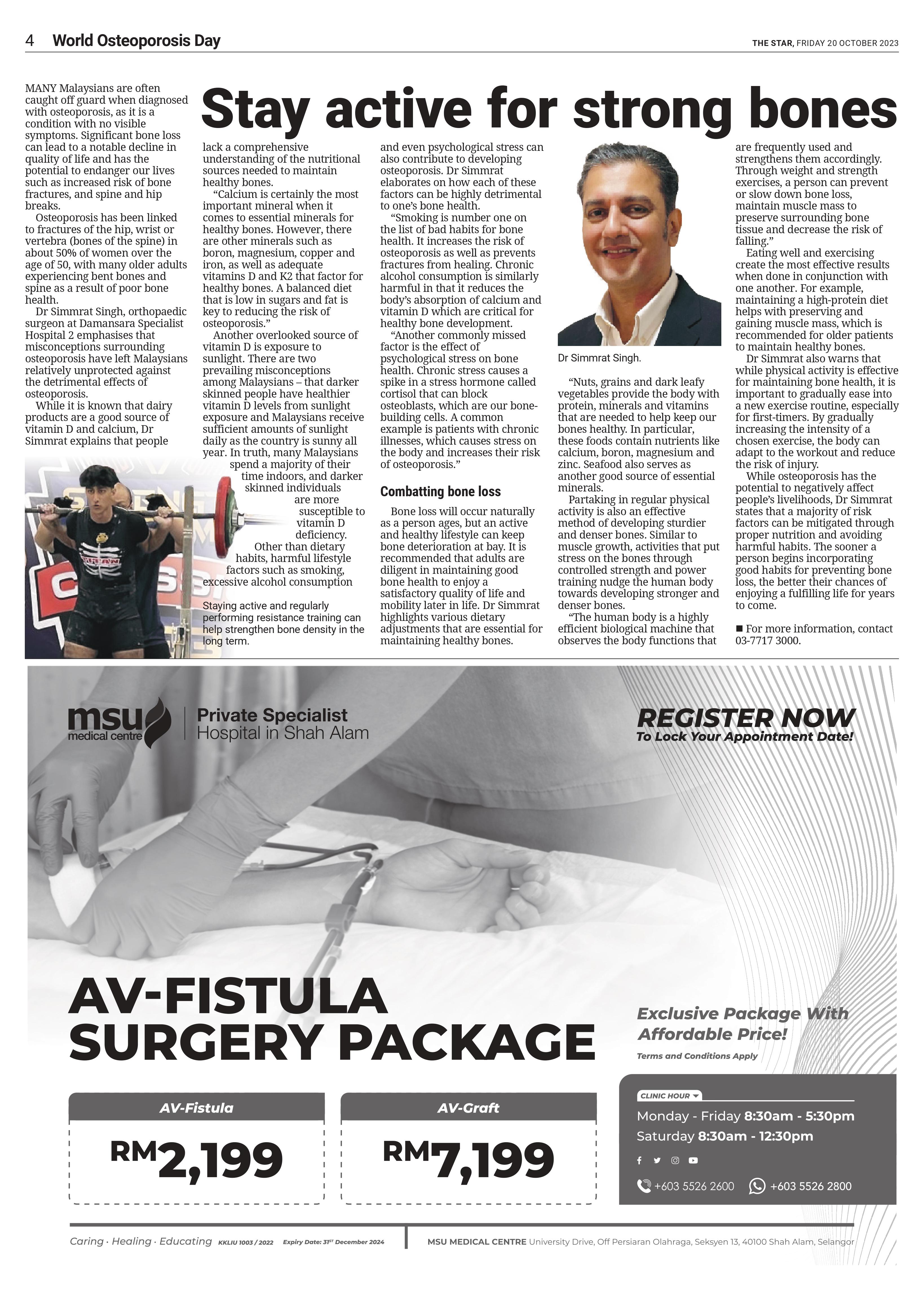World Osteoporosis Day: Stay active for strong bones

Stay active for strong bones
MANY Malaysians are often caught off guard when diagnosed with osteoporosis, as it is a condition with no visible symptoms. Significant bone loss can lead to a notable decline in quality of life and has the potential to endanger our lives such as increased risk of bone fractures, and spine and hip breaks. Osteoporosis has been linked to fractures of the hip, wrist or vertebra (bones of the spine) in about 50% of women over the age of 50, with many older adults experiencing bent bones and spine as a result of poor bone health. Dr Simmrat Singh, orthopaedic surgeon at Damansara Specialist Hospital 2 emphasises that misconceptions surrounding osteoporosis have left Malaysians relatively unprotected against the detrimental effects of osteoporosis.
While it is known that dairy products are a good source of vitamin D and calcium, Dr Simmrat explains that people lack a comprehensive understanding of the nutritional sources needed to maintain healthy bones. “Calcium is certainly the most important mineral when it comes to essential minerals for healthy bones. However, there are other minerals such as boron, magnesium, copper and iron, as well as adequate vitamins D and K2 that factor for healthy bones.
A balanced diet that is low in sugars and fat is key to reducing the risk of osteoporosis.” Another overlooked source of vitamin D is exposure to sunlight. There are two prevailing misconceptions among Malaysians – that darker skinned people have healthier vitamin D levels from sunlight exposure and Malaysians receive sufficient amounts of sunlight daily as the country is sunny all year.
In truth, many Malaysians spend a majority of their time indoors, and darker skinned individuals are more susceptible to vitamin D deficiency. Other than dietary habits, harmful lifestyle factors such as smoking, excessive alcohol consumption and even psychological stress can also contribute to developing osteoporosis. Dr Simmrat elaborates on how each of these factors can be highly detrimental to one’s bone health. “Smoking is number one on the list of bad habits for bone health. It increases the risk of osteoporosis as well as prevents fractures from healing.
Chronic alcohol consumption is similarly harmful in that it reduces the body’s absorption of calcium and vitamin D which are critical for healthy bone development. “Another commonly missed factor is the effect of psychological stress on bone health. Chronic stress causes a spike in a stress hormone called cortisol that can block osteoblasts, which are our bone-building cells. A common example is patients with chronic illnesses, which causes stress on the body and increases their risk of osteoporosis.”
Combatting Bone Loss
Bone loss will occur naturally as a person ages, but an active and healthy lifestyle can keep bone deterioration at bay. It is recommended that adults are diligent in maintaining good bone health to enjoy a satisfactory quality of life and mobility later in life. Dr Simmrat highlights various dietary adjustments that are essential for maintaining healthy bones. “Nuts, grains and dark leafy vegetables provide the body with protein, minerals and vitamins that are needed to help keep our bones healthy. In particular, these foods contain nutrients like calcium, boron, magnesium and zinc. Seafood also serves as another good source of essential minerals.
Partaking in regular physical activity is also an effective method of developing sturdier and denser bones. Similar to muscle growth, activities that put stress on the bones through controlled strength and power training nudge the human body towards developing stronger and denser bones. “The human body is a highly efficient biological machine that observes the body functions that are frequently used and strengthens them accordingly.
Through weight and strength exercises, a person can prevent or slow down bone loss, maintain muscle mass to preserve surrounding bone tissue and decrease the risk of falling.” Eating well and exercising create the most effective results when done in conjunction with one another. For example, maintaining a high-protein diet helps with preserving and gaining muscle mass, which is recommended for older patients to maintain healthy bones.
Dr Simmrat also warns that while physical activity is effective for maintaining bone health, it is important to gradually ease into a new exercise routine, especially for first-timers. By gradually increasing the intensity of a chosen exercise, the body can adapt to the workout and reduce the risk of injury. While osteoporosis has the potential to negatively affect people’s livelihoods, Dr Simmrat states that a majority of risk factors can be mitigated through proper nutrition and avoiding harmful habits. The sooner a person begins incorporating good habits for preventing bone loss, the better their chances of enjoying a fulfilling life for years to come.
For more information, contact 03-7717 3000.




 Promotion
Promotion
 Find Doctor
Find Doctor


